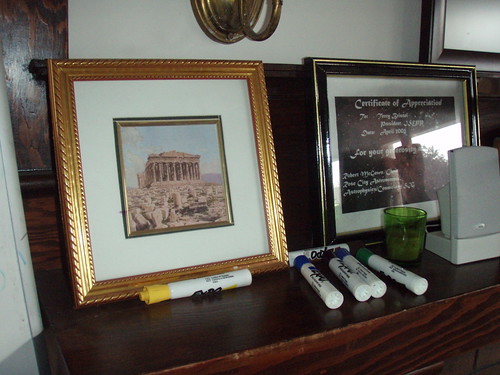What some would deem mere superstition might be seen more as a code language by true believers.
Consider for example how in German language philosophy we find "Apollonian" and "Dionysian" used to typify both lifestyles and habits of thought.
English users did this too (invoked Greek dieties), with Psychology eventually lending an imprimatur of approval thanks to groundbreaking work in Vienna and Zurich. We just needed that "collective unconscious" to store this stuff in, an approved container, known to science.
Hamlet's Mill, a work of scholarship, points out how those pointing the finger of superstition often miss the encoded astronomical information. Once major players are seen to be star constellations, the myth becomes a mnemonic to help organize the public sky, the archetypal shared namespace.
Nietzsche, not a German national (don't confuse him with Heidegger), used such language to talk about the Zeitgeist, another good German word, which translates literally as "world spirit" or even "ghost". He focused on pop culture, namely Wagner's operas. He had a famous falling out with Wagner which only fueled more famous writing (he really liked Wagner's wife).
The concept of Zeitgeist is not that spooky though: every company or team comes with a bonding chemistry that makes it a whole in its own dimension and we need ways of encoding this information.
We don't see it as "believing in" so much as "accounting for" and "hoping to predict". OK, call it soothsaying, call it Wall Street (some floors of it), call it what you will. If you want to look over the shoulders of some Quaker readers, maybe check out the books of Walter Wink?
Mythic tensions among the Greek deities reflected in these great discorporate battles we call "myths" are seen to this day, now encoded more in law than in storytelling. The rules of trade are more fixed, more computerized. Legal maneuvering has replaced the more memorable stories of mostly pre-literate / oral tradition cultures.
I've joined in such simulation gaming or modeling, using the Greek myth namespace. Athena has a temple in Nashville that impressed me. Following her thread back to the homeland, I came upon a friendly Python under Mount Parnassus in Delphi, and having something to do with Athena's priestesses' oracular powers. Delphi became the top brand in consulting firms.
Intersecting the above: the open source computer language Python and the Monty Python comedy troupe after which it was named. Geeks-with-laptops are so much like musicians-with-guitars, and with other instruments, like we find in Nashville. They're looking for opportunities to showcase their talents.
I played up this theme one OSCON when Gibson Guitar sent a bizmo (business bus). Athena represents wisdom and music, not just excellence in war (she's a female counterpart of Mars in some ways).
Back to the future, wherein Greek myth is hardly an everyday language, I've been studying The Math Myth by Andrew Hacker, and wondering how the threads would continue were Forum 206 still an active listserv. A lot of the same memes are flying around in Hacker's wind tunnel.
I should mention, though, before dropping Greek mythos as topical, that Apollo ran that friendly Python out of Delphi in a somewhat hostile takeover that did not shut down the profitable oracle business, just put it on a more "rational" left brain basis.
Apollo might stand for AI (Artificial Intelligence) and a somewhat bot-like "We are Borg" approach that vanquished the Python ("slew the dragon" in later versions). That our Python escaped to Nashville and re-established is an added wrinkle. Apollo will learn to live with it I'm sure.
The Math Myth advocates lowering the voltage pressure on some circuits, especially where the steep climb over Calculus Mountain is concerned (one of my topics), starting in the foothills of algebra.
That trek has enjoyed privileged status thanks to huge amounts of hype (we learn about marketing in Supermarket Math, and Casino Math as risks are involved). Diagramming the entire rewiring that's taking place is beyond my ability to summarize in a pithy manner, so lets skip most of that narrative for now.
How about these course titles below for both college and pre-college math courses (from mathfuture listserv). None become exhausted in a hurry so keep spiraling through them in work / study mode. Take them all to a new level.
Data Science and Public Policy (civics spin)
Probability and Simulations (more programming goes here)
Graphic Arts and Communications (includes the Fuller.4D sculpture)
Staying Safe in Cyberspace (computer security)
Consider for example how in German language philosophy we find "Apollonian" and "Dionysian" used to typify both lifestyles and habits of thought.
English users did this too (invoked Greek dieties), with Psychology eventually lending an imprimatur of approval thanks to groundbreaking work in Vienna and Zurich. We just needed that "collective unconscious" to store this stuff in, an approved container, known to science.
Hamlet's Mill, a work of scholarship, points out how those pointing the finger of superstition often miss the encoded astronomical information. Once major players are seen to be star constellations, the myth becomes a mnemonic to help organize the public sky, the archetypal shared namespace.
Nietzsche, not a German national (don't confuse him with Heidegger), used such language to talk about the Zeitgeist, another good German word, which translates literally as "world spirit" or even "ghost". He focused on pop culture, namely Wagner's operas. He had a famous falling out with Wagner which only fueled more famous writing (he really liked Wagner's wife).
The concept of Zeitgeist is not that spooky though: every company or team comes with a bonding chemistry that makes it a whole in its own dimension and we need ways of encoding this information.
We don't see it as "believing in" so much as "accounting for" and "hoping to predict". OK, call it soothsaying, call it Wall Street (some floors of it), call it what you will. If you want to look over the shoulders of some Quaker readers, maybe check out the books of Walter Wink?
Mythic tensions among the Greek deities reflected in these great discorporate battles we call "myths" are seen to this day, now encoded more in law than in storytelling. The rules of trade are more fixed, more computerized. Legal maneuvering has replaced the more memorable stories of mostly pre-literate / oral tradition cultures.
I've joined in such simulation gaming or modeling, using the Greek myth namespace. Athena has a temple in Nashville that impressed me. Following her thread back to the homeland, I came upon a friendly Python under Mount Parnassus in Delphi, and having something to do with Athena's priestesses' oracular powers. Delphi became the top brand in consulting firms.
Intersecting the above: the open source computer language Python and the Monty Python comedy troupe after which it was named. Geeks-with-laptops are so much like musicians-with-guitars, and with other instruments, like we find in Nashville. They're looking for opportunities to showcase their talents.
I played up this theme one OSCON when Gibson Guitar sent a bizmo (business bus). Athena represents wisdom and music, not just excellence in war (she's a female counterpart of Mars in some ways).
Back to the future, wherein Greek myth is hardly an everyday language, I've been studying The Math Myth by Andrew Hacker, and wondering how the threads would continue were Forum 206 still an active listserv. A lot of the same memes are flying around in Hacker's wind tunnel.
I should mention, though, before dropping Greek mythos as topical, that Apollo ran that friendly Python out of Delphi in a somewhat hostile takeover that did not shut down the profitable oracle business, just put it on a more "rational" left brain basis.
Apollo might stand for AI (Artificial Intelligence) and a somewhat bot-like "We are Borg" approach that vanquished the Python ("slew the dragon" in later versions). That our Python escaped to Nashville and re-established is an added wrinkle. Apollo will learn to live with it I'm sure.
The Math Myth advocates lowering the voltage pressure on some circuits, especially where the steep climb over Calculus Mountain is concerned (one of my topics), starting in the foothills of algebra.
That trek has enjoyed privileged status thanks to huge amounts of hype (we learn about marketing in Supermarket Math, and Casino Math as risks are involved). Diagramming the entire rewiring that's taking place is beyond my ability to summarize in a pithy manner, so lets skip most of that narrative for now.
How about these course titles below for both college and pre-college math courses (from mathfuture listserv). None become exhausted in a hurry so keep spiraling through them in work / study mode. Take them all to a new level.
Data Science and Public Policy (civics spin)
Probability and Simulations (more programming goes here)
Graphic Arts and Communications (includes the Fuller.4D sculpture)
Staying Safe in Cyberspace (computer security)


